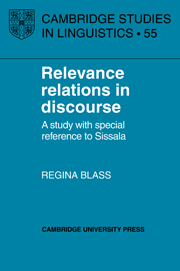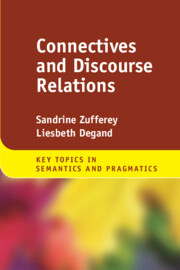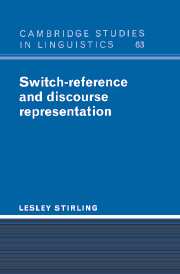Relevance Relations in Discourse
Using data from Sissala, a previously unanalyzed language, this book shows that the analysis of text and discourse is best approached from a cognitive rather than a strictly linguistic point of view. In two introductory chapters, Regina Blass argues that Sperber and Wilson's relevance theory, a general account of communication and cognition, sheds more light on conversational data than do alternative linguistic approaches based on such notions as cohesion, coherence, and topic. In subsequent chapters, she discusses the Sissala equivalents of words such as "indeed," "so," "after all," and "also," and compares them with their English, French, and German counterparts.
This book offers convincing evidence that although cultural backgrounds may vary considerably, the principles involved in utterance interpretation are universally the same.
Reviews & endorsements
"The greatest strength of this book is the originality of the research." Notes on Linguistics
"B's study contains a host of interesting observations and ideas, and reading it is very thought-provoking and rewarding." Language
"Regina Blass's book can be recommended to anyone interested in DA on a more advanced level and in particular to students of discourse of an interpretive orientation." Rask
Product details
November 2006Paperback
9780521032049
300 pages
228 × 151 × 17 mm
0.456kg
Available
Table of Contents
- Acknowledgements
- List of abbreviations and symbols
- Maps
- Introduction
- 1. What is discourse?
- 2. Relevance theory and discourse
- 3. The interpretive-use marker ré
- 4. Constraints on relevance and particle typology
- 5. Baa: truth-conditional or non-truth-conditional particle?
- 6. Defining in Sissala
- 7. Meanings and domains of universal quantification
- 8. Co-ordination and stylistic effects
- Notes
- References
- Index.





